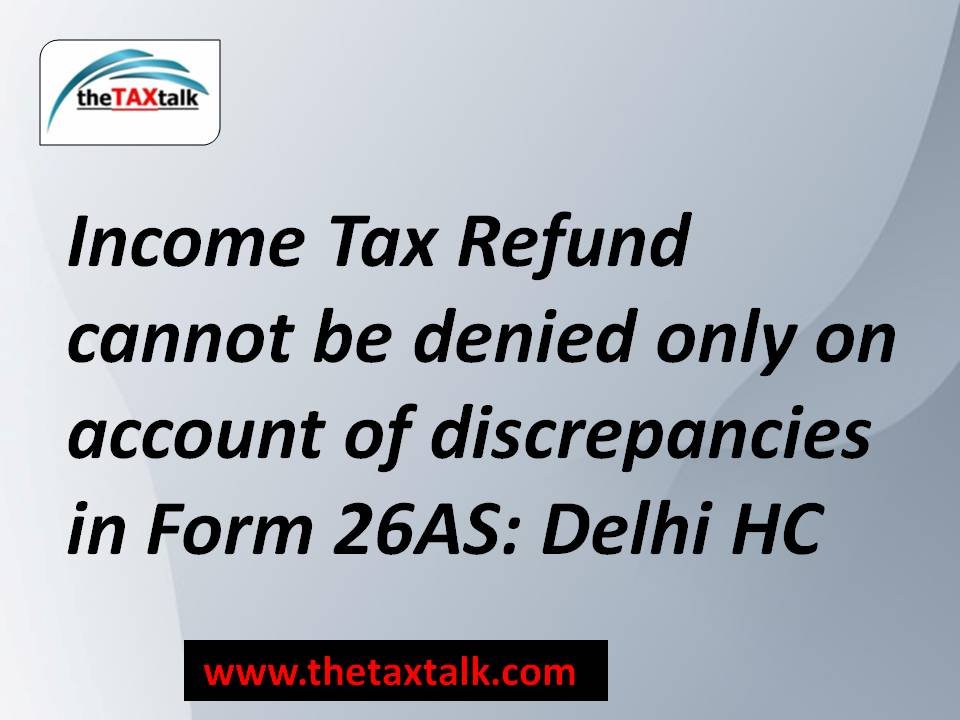![]()
Income Tax Refund cannot be denied only on account of discrepancies in Form 26AS: Delhi HC
Facts of the Case:
1. Compensation Received Under Land Acquisition Act: The petitioner, Hari Kishan Sharma , received compensation of INR 18,59,239 under the Land Acquisition Act, 1894, during the Financial Year 2009-10. The Land Acquisition Collector (LAC) deducted INR 1,68,118 as Tax Deducted at Source (TDS) from the compensation.
2. Tax Return for AY 2010-11 : The petitioner filed his Income Tax Return (ITR) for the Assessment Year (AY) 2010-11 on June 24, 2010, declaring an income of INR 5,26,580, which was processed under Section 143(1) of the Income Tax Act on January 27, 2011.
3. Discrepancy in Form 26AS : Despite the LAC having deducted TDS, this deduction was not reflected in the petitioner’s Form 26AS (Annual Tax Statement). As a result, the petitioner did not receive credit for the TDS, nor was it acknowledged by the Income Tax Department.
4. Initial Legal Action : Due to the discrepancy in Form 26AS, the petitioner approached the Delhi High Court via a writ petition, seeking a direction to the LAC to grant him appropriate TDS credit. In response, the court ordered the LAC to examine the petitioner’s grievance, and the LAC subsequently issued a revised Form 16A reflecting the TDS on December 2, 2017.
5. Application for Revised Return Denied : Following the issuance of the revised Form 16A, the petitioner applied to the tax authorities for permission to file a revised ITR for AY 2010-11. However, the application was denied by the Principal Commissioner of Income Tax (PCIT) through an order dated October 23, 2018, citing CBDT Circular No. 09/2015. The circular imposed a six-year limitation on filing revised returns, and the application was submitted beyond this period.
6. Filing of Writ Petition : In response to the denial, the petitioner filed another writ petition in the Delhi High Court seeking:
– Quashing of the impugned order dated October 23, 2018.
– Permission to file a revised ITR and claim the TDS refund of INR 1,68,118 along with interest.
– Directions for the tax authorities to account for the TDS in the petitioner’s Form 26AS.
– Compensation for damages and interest on the delayed refund.
Delhi High Court Order:
1. TDS Discrepancy Not the Petitioner’s Fault : The Delhi High Court noted that the discrepancy in Form 26AS was not due to any error on the part of the petitioner. The TDS was validly deducted by the LAC but was not properly reflected in Form 26AS. As such, it was unjust to deny the petitioner the benefit of the TDS credit based on this discrepancy.
2. No Time Limitation for the Court’s Extraordinary Jurisdiction : The court rejected the tax department’s reliance on the six-year limitation period imposed by CBDT Circular No. 09/2015. The court held that such circulars cannot limit its powers under Article 226 of the Constitution, which allows for judicial review and relief in cases of legal grievances.
3. Statutory Provisions Favor the Petitioner : The court referred to Sections 199 and 155(14) of the Income Tax Act, which mandate that tax deducted by a third party (here, the LAC) must be treated as payment of tax on behalf of the assessee. Further, the petitioner was entitled to credit for the TDS even if it was reflected late. Section 237 also entitled the petitioner to claim a refund of any excess tax deducted.
4. Revised Return Must Be Accepted : The court quashed the impugned order of the PCIT dated October 23, 2018, and directed the tax authorities to allow the petitioner to file a revised return for AY 2010-11. The return had to be filed within four weeks from the date of the judgment.
5. Processing of Refund : The court ordered that the revised return be placed before the Assessing Officer (AO) for processing, and any refund due must be granted. The court emphasized that the tax authorities must also consider the statutory provisions regarding interest on delayed refunds while making the decision.
6. Equity Considerations : The court also found it inequitable to apply a strict limitation period in a case where the petitioner was forced to seek judicial relief and where the tax authority failed to address the issue for several years.
The copy of the order is as under:


